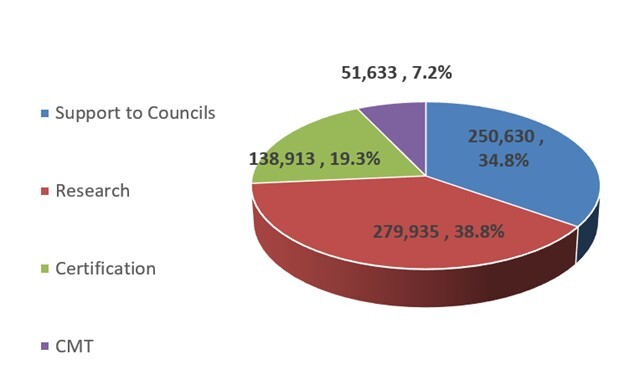Line of Business Updates
Deliveries and Certifications
Throughout 2021-22, ICCS facilitated over 20 training sessions for organizations from across the Canadian Public Sector as follows:
- 2 Certified Service Professional (CSP) workshops
- 14 Certified Service Manager (CSM) workshops
- 6 ICCS Customized Workshops
Licensed jurisdictions continue to facilitate ICCS training on our behalf within their respective organizations, with over 500 public sector employees participating in over 20 deliveries across Canada this year.
We are pleased to share that we now have over 1000 certified CSPs and CSMs across the Canadian public sector.
Developments
In 2021-22, we continued to develop and release new online training programs in efforts to expand our available offerings. New courses released this past year include:
- Guide to Effective Service Delivery Management
- Guide to Continuous Service Improvement
- Building Inclusive Leadership Culture
ICCS continues to explore new areas of focus for additional learning content and the future development of new learning modules.
In addition to our own programs, we are now offering government organizations the ability to customize and host their own in-house learning content based on Citizen First eLearning modules. We look forward to helping partners design and develop meaningful, government-specific training.
We are pleased to continue partnering with various working groups and sub-committees of the Joint Councils for the purpose of aiding the development of free-to-use resources and playbooks made available for the broader Canadian public sector.
Partnerships
ICCS is pleased to have worked with the following organizations:
- Provincial Government of British Columbia
- Provincial Government of Newfoundland & Labrador
- Provincial Government of Manitoba
- Provincial Government of Nova Scotia
- Government of Northwest Territories
- City of Sarnia
- Joint Councils (Public Sector Service Delivery Council and Public Service Chief Information Officer Council)
- Apolitical
Citizens First 2020
The Citizens First 2020 report was completed in July 2021 and was followed by a series of webinars and presentations of the results to various stakeholder groups. The study provided insights on how Canadians viewed government performance during the COVID-19 pandemic, and the fact that the survey was implemented in four separate waves helped to track shifting attitudes and better identify emerging trends.
One of the key messages coming out of the study was the emergence of digital channels as the main way for Canadians to access government services. Another noteworthy finding was that, even in the face of the pandemic and the challenges that it posed, the scores on some of the key metrics have been largely maintained or even slightly increased. This, however, should not overshadow the fact that, as Citizens First 2020 has shown, the public sector continues to underperform when it comes to some important aspects of service delivery. For example, issue resolution continues to receive low ratings and the gap between expectations for timeliness and actual service experience continues to grow.
Business First 2022
In the second half of 2022, the ICCS launched the next iteration of its business survey. Business First 2022 brought together five participating jurisdictions representing federal, provincial and territorial governments. Similar to Citizens First, the study took a close look at the impact of COVID-19 by asking businesses a series of detailed questions about government performance in the face of the pandemic. Data collection for the survey was conducted in a single wave, from December 2021 to March 2022, with the results set to become available in July 2022.
Emotional Engagement Research and AI
The ICCS has continued its collaboration with PathosAI on developing a service that employs an emotional engagement model and AI methods to allow public sector service providers to go beyond traditional research approaches and utilize a broader range of data sources to assess their performance. The early pilot saw the use of recent Citizens First open-ended data and, following completion of Business First 2022, the methodology is set to be tested in the context of a business client survey. This exploration of new approaches to measuring client experience is closely aligned with the ICCS’ continued commitment to expanding its range of analytical options and enhancing the quality of insights available to public sector organizations.
In 2021-22, the ICCS Secretariat continued to provide support services to the Public Sector Service Delivery Council (PSSDC) and the Public Sector Chief Information Officer Council (PSCIOC). The Secretariat organized monthly virtual meetings of the Joint Councils, PSSDC, PSCIOC, and learning event sessions on topics of pan-Canadian interest and sharing of best practices from across the country.
The Joint Councils, PSSDC and PSCIOC oversee many inter-jurisdictional working groups and communities of practice that focus on the Councils’ identified priority areas: Digital Identity, Client Centric Services, Research and Strategic Intelligence, Privacy, Cybersecurity, IT Procurement, Cloud Services, Service to Business, Open Source, Open Government, among others. A key mandate of the Councils is inter-jurisdictional collaboration to enhance the efficacy of public sector service delivery.
Delivering a Digital Identity and Trust Program is a key priority for the Joint Councils. The Councils remain committed to accelerating the work to deliver trusted digital identity for Canadians. Citizens want quick, convenient access to online programs and services from both public and private sectors and to be assured that their personal information will be collected, used, and disclosed in accordance not only with the principles of Privacy by Design, but also in accordance with applicable laws and regulations. Digital identity is crucial to transforming government services. Digital Government requires more than incremental changes to address current and forthcoming challenges, which implies reconfiguring the responsibilities of different levels of government and how they intersect and coordinate - essentially rethinking the architecture of government, especially governance and leadership. The Joint Councils remain conscious of the fluid external environment in which it operates and that it needs to be attentive and responsive to change. They frequently re-visit priorities whilst consulting with members to ensure that its best positioned for collective impact.
The Joint Councils demonstrated these principles for placing citizens at the centre of the service experience, enabling citizens with their data, and ensuring good privacy design in solutions through the contribution the Councils made to the design of the solutions for issuing Canadians with a digital Proof of Vaccination. The design advanced by the Councils did not feature back-end systems data sharing among the various government departments and other organizations. Instead, the design advanced through the Councils that was embraced in the solutions from the various jurisdictions featured a digital proof of vaccination. It is issued directly to each Canadian, that involves only the minimum identity and health information that is essentially required, and where the individual Canadian holding their proof of vaccination is the one authorizing the sharing. These same principles are being carried forward into the ongoing work of the Councils to advance solutions for digital trust and digital identity.
Notable research by the Joint Councils this year:
- The Data Driven Intelligence Working Group delivered a report on “Insights into the Public’s Acceptance of Government Use of Data”. The report provides a better understanding of public acceptance for the use and sharing of data for the improvement of public services within and across levels of government. The report provides the foundational material for future work to investigate and outline options to address legislative, policy and data sharing barriers to integrated and seamless service delivery.
- The Analytics Playbook Working Group delivered a digital version of the Analytics Playbook to support and advance the use of analytics across public sector organizations. It is both educational and instructive, articulating the value of analytics, identifying success factors that policy makers and leadership teams need to be thinking about advancing, and defining how organizations can get started on their analytics journey. The Analytics Playbook details notable achievements of Federal, Provincial/Territorial, and Municipal organizations with respect to the partnerships and projects that have used analytics to improve service delivery.
- The Research Committee delivers monthly executive research reports to highlight key priority areas of the Councils. It delivers a daily newsletter based on media monitoring on key Council service delivery and IT/IM priorities and continues to update and monitor the on-line research repository to collect and enable open access to cutting-edge research
The Common Measurements Tool (CMT) continues to be employed by several jurisdictions both in Canada and internationally. This is coupled with the growing use of the Citizen First Analytics (CF Analytics), the recently introduced platform that allows CMT users not only to benchmark their results but also to conduct additional types of analysis, such as identification of key drivers and insights based on open-ended data. The ICCS is currently working with its partners from PigeonLine on expanding the range of analytical options even further, for instance, by integrating Citizens First and Business First data.
The past year saw the ICCS, in partnership with PigeonLine, deliver a number of sessions on the use of the CF Analytics service that were directed at both general and more specific audiences, such as the Municipal Service Delivery Office. The hands-on nature of the workshops contributed to increased interest in the service and resulted in ongoing discussions with various jurisdictions. The outreach and marketing efforts are set to continue in the months and years to come.
Aside from offering an increasingly comprehensive set of solutions to public sector organizations looking to understand their clients’ service experience, which they can access nearly instantaneously through the self-serve option, the ICCS also continues to actively support their efforts by being involved at various stages of the service improvement process. The scope and nature of this involvement depends on the specific needs and requirements of the client. The organizations with whom the ICCS has been collaborating in this way recently include BizPaL, FrontCounter BC and Service Canada/ESDC.
In 2021-22, the following jurisdictions and organizations were licensed to use the CMT:
Canada:
- Alberta Workers’ Compensation Board
International:



